Comprehensive Guide to Garden Maintenance in Whitechapel

Introduction to Garden Maintenance in Whitechapel
Maintaining a beautiful garden in Whitechapel requires dedication, knowledge, and the right set of skills. Whether you're a seasoned gardener or a novice, understanding the unique challenges and opportunities presented by Whitechapel's climate and urban setting is essential for achieving a thriving outdoor space.
Whitechapel, located in the heart of East London, offers a diverse environment that affects garden maintenance practices. From the soil quality to local plant species, each factor plays a significant role in how you approach your garden care routines.
In this guide, we'll explore the various aspects of garden maintenance specific to Whitechapel, providing you with valuable insights and practical tips to keep your garden lush and healthy all year round.

Understanding the Local Climate
Climate Overview
Whitechapel experiences a temperate maritime climate, characterized by mild winters and cool summers. This climate provides a conducive environment for a wide variety of plants, but it also poses certain challenges that gardeners must navigate.
The average annual temperature in Whitechapel hovers around 11°C (52°F), with precipitation spread throughout the year. Understanding these climatic conditions is crucial for selecting the right plants and scheduling maintenance tasks effectively.
Additionally, urban heat islands can impact your garden, leading to higher temperatures and altered rainfall patterns. Being aware of these microclimates helps in making informed decisions about garden placement and plant selection.
- Temperature: Mild winters and cool summers
- Precipitation: Evenly distributed throughout the year
- Urban Heat Island Effect: Higher temperatures in urban areas

Soil Health and Preparation
Testing and Improving Soil Quality
The foundation of any thriving garden is healthy soil. In Whitechapel, urban soil can often be compacted or contaminated, making soil testing a crucial step in garden maintenance.
Investing in a comprehensive soil test will help you determine pH levels, nutrient deficiencies, and the presence of contaminants. Based on the results, you can amend the soil with organic matter, fertilizers, or other necessary treatments to create an optimal growing environment.
Incorporating compost and mulch not only enriches the soil but also promotes better water retention and reduces weed growth, contributing to a more sustainable garden.
- Conduct a soil test
- Amend the soil based on test results
- Incorporate compost and mulch
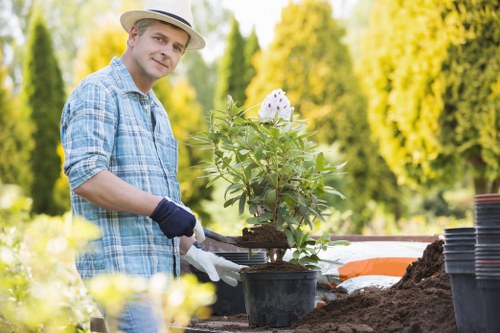
Plant Selection and Care
Choosing the Right Plants
Selecting plants that are well-suited to Whitechapel's climate and soil conditions is paramount for successful garden maintenance. Opt for native species or those known to thrive in similar environments.
Consider factors such as sunlight exposure, water requirements, and growth patterns when choosing plants. This ensures that your garden remains resilient against local pests and diseases, reducing the need for extensive care.
Incorporating a mix of perennials, annuals, shrubs, and trees can add diversity and visual interest to your garden while promoting ecological balance.
- Native Plants: Adapted to local conditions
- Perennials and Annuals: Provide seasonal variety
- Diverse Plant Selection: Enhances ecological balance
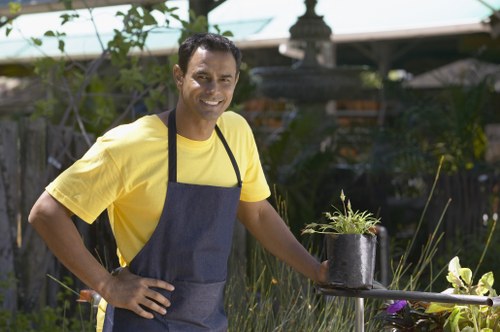
Seasonal Maintenance Tips
Spring Care
Spring is the perfect time to rejuvenate your garden after the winter months. Begin by cleaning up debris, pruning dead branches, and preparing the soil for new plantings.
Introduce new plants and seeds, ensuring they receive adequate water and nutrients to establish strong roots before the warmer months arrive.
Regularly monitor for pests and diseases, addressing any issues promptly to prevent them from spreading and causing significant damage.
Summer Care
During the summer, focus on maintaining consistent watering schedules to combat the heat and keep your plants hydrated. Mulching can help retain moisture and regulate soil temperature.
Prune regularly to encourage healthy growth and remove any diseased or damaged foliage. This not only enhances the appearance of your garden but also promotes better air circulation.
Consider implementing shading techniques for delicate plants to protect them from intense sunlight.
Additional Summer Tips
- Install efficient irrigation systems
- Use organic fertilizers to nourish plants
- Monitor plant health regularly

Winterizing Your Garden
Preparing for Cold Weather
Winter poses unique challenges for garden maintenance in Whitechapel. Protect your plants by applying a thick layer of mulch to insulate the soil and prevent root damage.
Prune evergreen shrubs carefully to maintain their shape and remove any weak branches that could break under snow or ice. This helps the plants remain healthy and resilient during the cold months.
Cover delicate plants with protective materials such as burlap or frost cloths to shield them from frost and harsh winds.
- Apply mulching to insulate the soil
- Prune evergreen shrubs
- Cover delicate plants
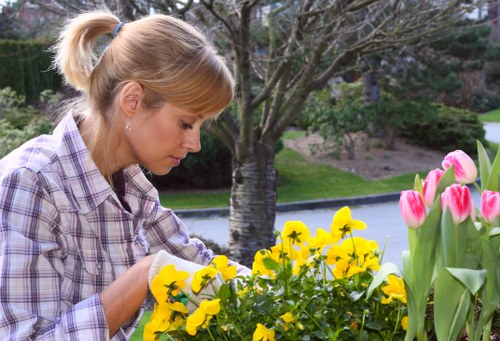
Pest and Disease Management
Integrated Pest Management (IPM)
Effective pest and disease control is essential for maintaining a healthy garden. Implementing an Integrated Pest Management (IPM) approach allows you to manage pests sustainably by combining biological, cultural, and chemical methods.
Regularly inspect your plants for signs of pests or diseases, and take immediate action to address any issues. Introducing beneficial insects, such as ladybugs and lacewings, can help keep pest populations in check naturally.
Rotate crops and practice good sanitation to reduce the likelihood of pest infestations and disease outbreaks, ensuring a robust and resilient garden environment.
- Biological Controls: Use beneficial insects
- Cultural Practices: Rotate crops and maintain cleanliness
- Chemical Controls: Apply pesticides sparingly when necessary

Hardscaping and Garden Structures
Enhancing Your Garden Space
Incorporating hardscaping elements such as pathways, patios, and garden furniture can significantly enhance the functionality and aesthetic appeal of your garden in Whitechapel.
Choose materials that complement your garden's design and are durable enough to withstand the local climate. Properly maintained garden structures not only add beauty but also provide practical benefits such as improved accessibility and organization.
Regularly inspect and maintain these structures to ensure their longevity and keep your garden looking pristine throughout the year.
- Design functional pathways and seating areas
- Select durable materials
- Maintain garden structures regularly
Popular Hardscaping Materials
- Natural stone
- Brick and concrete
- Wood and metal
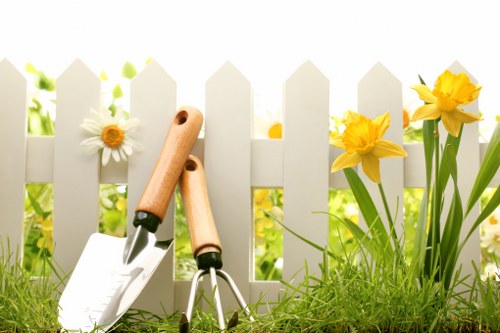
Eco-Friendly Gardening Practices
Sustainable Maintenance Techniques
Adopting eco-friendly gardening practices not only benefits the environment but also contributes to the long-term health of your garden. Implementing techniques such as composting, rainwater harvesting, and using organic fertilizers can make your garden more sustainable and resilient.
Composting kitchen scraps and garden waste enriches the soil with essential nutrients, reducing the need for synthetic fertilizers. Harvesting rainwater provides an eco-friendly water source, particularly useful during dry spells.
Choosing organic pest control methods minimizes the impact on beneficial insects and reduces chemical runoff, promoting a healthier ecosystem within your garden.
- Composting: Recycle organic waste into valuable soil amendments
- Rainwater Harvesting: Collect and use rainwater for irrigation
- Organic Fertilizers: Enhance soil fertility naturally
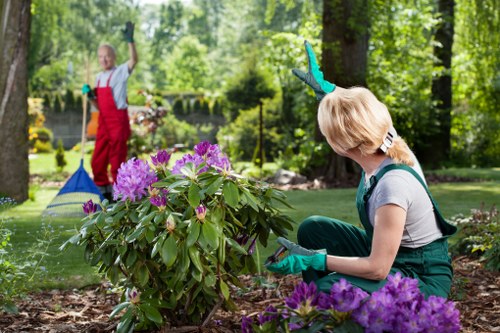
Professional Garden Maintenance Services
Benefits of Hiring Experts
While DIY garden maintenance can be rewarding, enlisting the help of professional garden maintenance services in Whitechapel offers numerous advantages. Professionals bring expertise, experience, and specialized equipment that can elevate the quality and efficiency of your garden care.
From regular lawn care and pruning to landscape design and pest management, professional services ensure that every aspect of your garden receives the attention it needs to thrive.
Moreover, professionals can provide personalized recommendations tailored to your garden's specific conditions, helping you achieve a beautiful and sustainable outdoor space with minimal effort on your part.
- Expert knowledge and experience
- Access to specialized equipment
- Customized maintenance plans
Choosing the Right Service Provider
When selecting a garden maintenance service in Whitechapel, consider factors such as reputation, range of services offered, and customer reviews. It's important to choose a provider that understands the local climate and has a proven track record of delivering high-quality results.
Key Considerations
- Experience and expertise
- Service flexibility and customization
- Competitive pricing
Cost-Effective Maintenance Strategies
Budgeting for Garden Care
Maintaining a garden in Whitechapel doesn't have to break the bank. Implementing cost-effective strategies can help you manage expenses while still achieving a beautiful and healthy garden.
Focus on preventative maintenance to avoid costly repairs down the line. Regularly pruning, weeding, and monitoring plant health can prevent more significant issues that require extensive intervention.
Additionally, embracing sustainable practices such as composting and rainwater harvesting can reduce reliance on paid services and external resources, further lowering your maintenance costs.
- Implement preventative care routines
- Use sustainable gardening practices
- Plan and budget for seasonal tasks
DIY vs. Professional Maintenance
Weighing Your Options
Deciding between DIY garden maintenance and hiring professionals is a common dilemma for many homeowners in Whitechapel. Both approaches have their merits, and the best choice depends on your specific needs, skills, and available time.
DIY maintenance offers the satisfaction of personally tending to your garden and can be more cost-effective for smaller projects. However, it requires time, effort, and a certain level of expertise to achieve optimal results.
On the other hand, professional services provide convenience, expertise, and comprehensive care but come at a higher cost. Weighing the pros and cons of each option will help you make an informed decision that aligns with your gardening goals.
- DIY Advantages: Cost savings, personal satisfaction
- Professional Advantages: Expertise, time-saving
- Considerations: Time, budget, garden size
Hybrid Approaches
For many, a hybrid approach that combines DIY efforts with professional support strikes the perfect balance. Handling routine tasks yourself while delegating more complex jobs to experts can optimize both cost and efficiency.
Innovative Gardening Techniques
Embracing Modern Methods
Staying updated with the latest gardening techniques can significantly enhance your garden's productivity and aesthetics. Innovations such as vertical gardening, hydroponics, and smart irrigation systems offer new ways to optimize space and resources.
Vertical gardening is particularly beneficial in urban settings like Whitechapel, where space is limited. It allows you to grow more plants in a smaller area, making efficient use of vertical space.
Hydroponics, a soil-less gardening method, can improve plant growth rates and yields while reducing water usage. Smart irrigation systems, controlled via mobile devices, ensure your garden receives the right amount of water at the right time, promoting sustainability and convenience.
- Vertical Gardening: Maximizes space and adds visual interest
- Hydroponics: Enhances growth efficiency
- Smart Irrigation: Optimizes water usage
Implementing Innovations
- Assess your garden's needs and space
- Choose appropriate technologies
- Integrate techniques systematically
Community and Support
Engaging with Local Gardeners
Connecting with other gardeners in Whitechapel can provide valuable support, ideas, and resources. Joining local gardening clubs, attending workshops, and participating in community events fosters a sense of camaraderie and shared knowledge.
These interactions can introduce you to new techniques, plant varieties, and solutions to common gardening challenges, enhancing your maintenance practices.
Additionally, community gardens offer opportunities to collaborate on larger projects, share tools and resources, and promote sustainable gardening within the neighborhood.
- Join local gardening clubs
- Attend workshops and seminars
- Participate in community garden projects
Conclusion and Next Steps
Achieving a Thriving Garden in Whitechapel
Maintaining a garden in Whitechapel is a rewarding endeavor that combines passion, knowledge, and consistent effort. By understanding the local climate, preparing your soil, selecting the right plants, and implementing effective maintenance strategies, you can cultivate a vibrant and sustainable garden.
Whether you choose to handle maintenance yourself or enlist the help of professionals, the key to success lies in proactive care and continuous learning.
Embrace the unique opportunities that Whitechapel offers, and transform your outdoor space into a beautiful haven that reflects your personal style and commitment to sustainability.
Ready to elevate your garden? Contact us today and let our expert team help you achieve the garden of your dreams in Whitechapel.